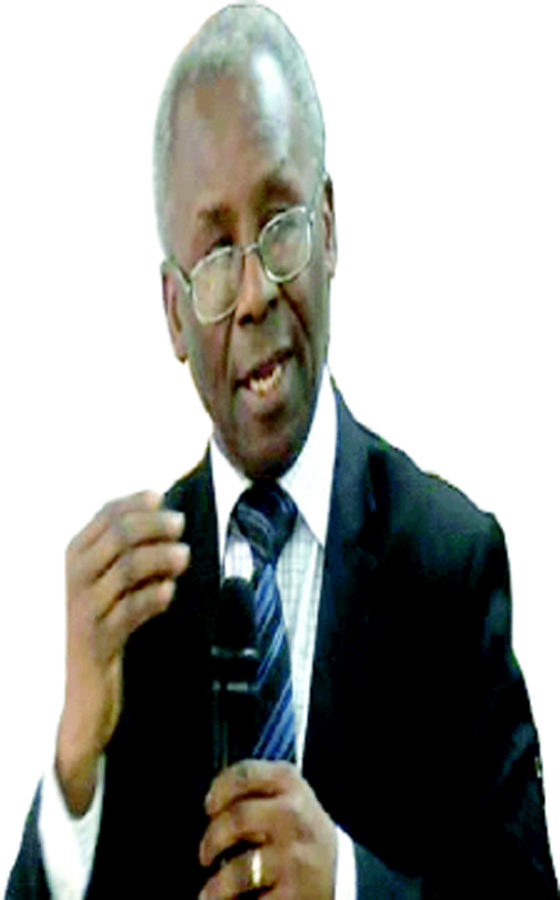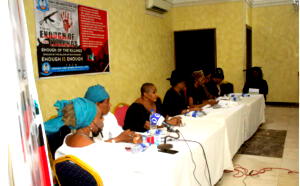…‘Stay more than three feet away from a person who is sick’ By Chioma Obinna Prof Tomori Oyewale is a renowned virologist and former...
 …‘Stay more than three feet away from a person who is sick’
…‘Stay more than three feet away from a person who is sick’
By Chioma Obinna
Prof Tomori Oyewale is a renowned virologist and former President of the Nigerian Academy of Science, NAS. In this interview, Oyewale says the suggestion that people should subject themselves to self-quarantine is a joke and certainly not implementable.
To him, government is not the most important or key player in preventing entry and spread of Coronavirus in Nigeria but the individual Nigerian and how honest he or she is, in complying with government guidelines on the disease.
Excerpts:
For the records, what is Coronavirus?
Coronavirus belongs to a large family of viruses that can cause illnesses ranging from common cold to more severe diseases such as the Middle East Respiratory Syndrome (MERS-CoV) and Severe Acute Respiratory Syndrome (SARS-CoV). A new Coronavirus named SAR-Cov-2, first detected in Wuhan City, Hubei Province, China, is the causative agent of the disease now known as Coronavirus disease 2019 (COVID-19).
The SARS-CoV-2 virus, like MERS-CoV and SARS-CoV viruses, all have their origins in bats. Coronaviruses are zoonotic, that is, they are transmitted between animals and people – SARS-CoV transmitted from civet cats to humans and MERS-CoV from camels to humans.
Investigations are on-going on the source of the current outbreak of SAR-Cov-2, it is not known how long the SAR-COV-2 virus can last outside the body or on glass/wooden surfaces; however, the viruses of MERS and SARS can last for nine days.
How does this spread?
COVID-19 is spread from person to person through small droplets from the nose or mouth when a person with COVID-19 coughs or sneezes.
Other times, droplets, which land on objects and surfaces around the person, can remain infectious for an undetermined length of time; becoming sources of infection for people who touch these objects or surfaces and then touch their eyes, noses or mouths. Infection with the virus can also occur from droplets from a coughing and sneezing COVID-19 infected person. It is, therefore, important to stay more than 1 meter (3 feet) away from a person who is sick. According to WHO, as of the 26th of February 2020, a little over 81,000 cases had been confirmed, with about 3, 000 deaths. Over 96 percent of these cases occurred in China, with the rest reported by 37 other countries in Asia, Europe, the Americas, Middle East, Pacific region and now Africa.
Is Coronavirus airborne and can mask prevent infection?
As I said earlier, COVID-19 is spread from person to person through small droplets from the nose or mouth when a person with COVID-19 coughs or sneezes. This means it can be spread by droplets and if you stay too close to a person coughing and sneezing, it can spread to you through air droplets. That is why people wear masks. Mask will prevent contamination with the virus when an infected person coughs or sneezes.
Do you think our health system is really prepared for this?
Yes, the Federal Ministry of Health has put in place at the ports of entry measures to check the temperature of incoming travelers. Capacity for laboratory diagnosis of suspected cases is available at the Nigeria Centre for Disease Control, NCDC. The Federal Ministry of Health has been proactive. Lagos State has once been stunned by Ebola and rose to the occasion of increasing awareness and putting in place measures to contain it.
READ ALSO: AS CORONA VIRUS RAGES… We are prepared to handle disease – NCDC
The issue of detection of suspected cases at our borders will depend on the commitment and dedication of the port health workers. Certainly, funds released by government will help if spent well on the intended purposes.
How do you assess activities at the ports?
On two occasions on my return to Nigeria from overseas trip, I witnessed activities at the airport which did not give confidence on our ability to detect suspected cases of the disease. The first time, there was only one temperature scanner and monitor, with a distracted staff member not paying due attention to the screening. Close to 10 passengers passed before the scan while the monitoring staff member had his attention diverted.
On the second occasion, more than 100 passengers were parked into the little space before the screen while completing forms. The staff member was certainly overwhelmed with monitoring the temperature scanner and checking the forms. The forms were collected without any scrutiny, and no information was passed on to the passengers on who to contact if they fall sick with fever and related symptoms of COVID-19.
The suggestion that people should subject themselves to self-quarantine is a joke and certainly not implementable. I think the important conclusion is that government is not the most important or key player in preventing entry and spread of Coronavirus in Nigeria. The most important is the individual Nigerian and how honest he or she is, in complying with government guidelines on Corornavirus disease, such as completing the entry form correctly, not saying NO when the answer should be YES, giving the correct dates for travels, etc. Officials at the entry point must give full attention to monitoring travelers entering the country and not be distracted. We must also have a better arrangement regarding completion of entry forms, perhaps distributing the forms in the plane before landing.
Do you think Nigerian labs have the capacity to detect Coronavirus?
I understand that the World Health Organisation, WHO, has provided reagents and other resources for the laboratory diagnosis of COVID-19. For now, these may be enough; however we will need to have more diagnostic centres should Nigeria record cases of COVID-19. For the exact figures of isolations centres, I do not know but certainly Lagos and Abuja have isolations centres, but I am not sure the other states are taking the issue with the deserved seriousness.
What other structures do you think government should put in place?
More than structures, we need to increase public awareness campaigns through radio and television, radio jingles, posters and discussion on the seriousness of the disease and the preventive and protective measures the public needs to adopt. For example, the people must be aware of the WHO standard recommendations on preventing infection, spreading and protection from infection – regular hand washing, covering mouth and nose when coughing and sneezing, thoroughly cooking meat and eggs, avoiding close contact with anyone showing symptoms of respiratory illness such as coughing and sneezing.
Can Nigerians handle this if it comes to Nigeria?
I should hope so. We handled Ebola …did we not? We are better prepared now than when Ebola came. Unfortunately, you cannot know how prepared you are until you have a case of COVID-19 in Nigeria.
- Interview conducted before Nigeria recorded her first case of COVID-19 last week
- Vanguard
The post COVID-19: Screening was shaky at our airport, I saw it – Prof. Tomori Oyewale, renowned virologist appeared first on Vanguard News.

No comments